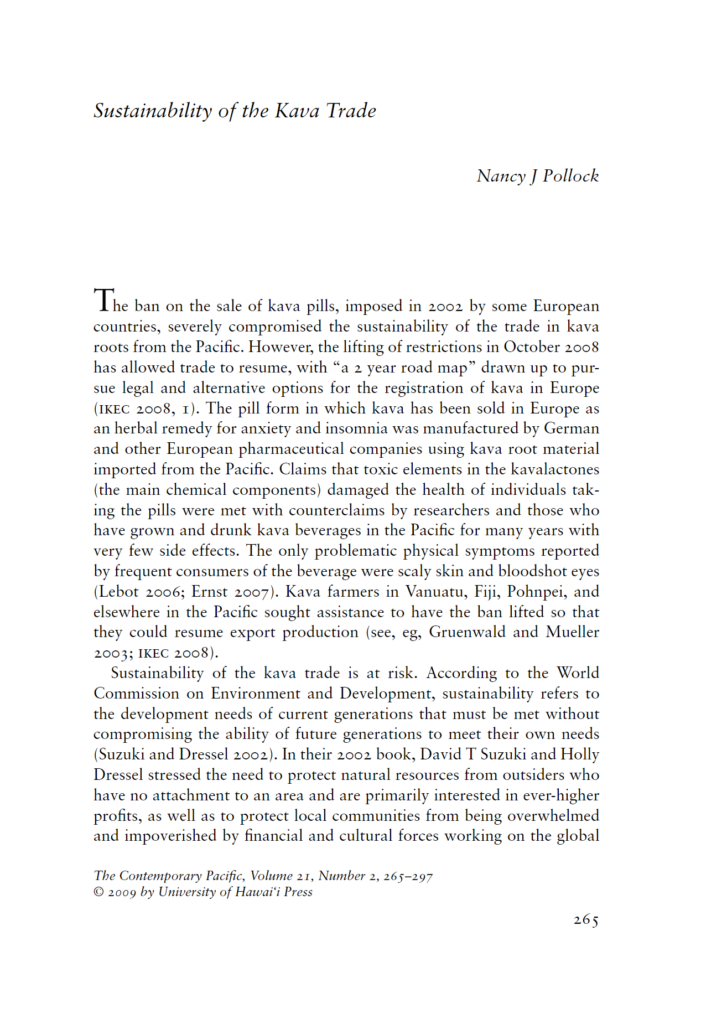The Kava Lounge Podcast
“The Kava Lounge,” hosted by Kavasseur and Jimmy Price, is a unique podcast dedicated to exploring the diverse world of Piper methysticum, commonly known as kava. The show’s format is both engaging and educational, aiming to fill the gap in entertaining and accessible information about this fascinating plant. The hosts’ enthusiasm for kava shines through as they discuss its rich history, cultural significance, and scientific research.
In a notable episode, Kavasseur and Price delve into Nancy J. Pollock’s influential paper, “The Sustainability of the Kava Trade,” published in “The Contemporary Pacific.” This paper, an anthropological study, explores the economic impacts of bans in Europe and Australia, the diverse cultural traditions of consumption across various societies, and the broader implications for the sustainability of the trade.
The podcast provides an in-depth overview of Pollock’s paper, critically examining its contents and implications. One significant point of discussion is Pollock’s focus on the consumption of kava in pill form in the U.S. and Europe, a perspective that the hosts feel overlooks the traditional and more widespread use of powdered kava. This leads to a broader conversation about how it is perceived and utilized in different cultures.
Kava’s cultural significance and its various iterations are central to the discussion. The hosts explore how kava is integral to rituals and ceremonies in many Pacific cultures, and how its role has evolved from a sacred, ritualistic element to a more secular, social beverage. This shift reflects broader cultural changes and adaptations over time.
An interesting facet of the conversation is the evolving role of women in kava ceremonies. Traditionally, in many cultures, kava ceremonies were predominantly male-dominated spaces. The podcast highlights how this is changing, with women becoming increasingly involved in these ceremonies, reflecting broader shifts in societal norms and gender roles.
“The Kava Lounge” also takes listeners on a geographical and cultural journey, tracing the path of kava from its origins in Vanuatu across the Pacific. This exploration sheds light on the different ways the plant is used and prepared in various regions, from the potent strains of Vanuatu to the ceremonial practices of Fiji and Tonga. The hosts discuss the numerous cultivars of piper methysticum, each with its unique effects and traditional methods of preparation.
A significant portion of the episode is dedicated to discussing the changes in kava consumption and public perception. The hosts reflect on the impact of colonial history on kava practices, noting how colonial powers often suppressed traditional use, leading to a decline in its cultural prominence. However, they also discuss the resurgence of kava in post-colonial societies, where it has become a symbol of national and cultural identity.
The discussion extends to modern trends in consumption, including the rise of kava bars in the West and the increasing popularity of the drink as a health and wellness product. The hosts speculate on the future of kava, considering both its potential for further global expansion and the challenges of maintaining sustainable practices in its cultivation and trade.
Throughout the episode, Kavasseur and Price interweave their personal experiences with kava, adding a relatable and intimate dimension to the discussion. They share anecdotes from their journeys with kava, from their initial encounters to their deepening appreciation and understanding of its cultural and historical contexts.
“The Kava Lounge” succeeds in presenting a comprehensive and engaging overview of kava, making it an invaluable resource for anyone interested in this remarkable plant. The podcast not only educates but also invites listeners to reflect on the broader implications of kava in society, from cultural practices to global trade, making it a must-listen for both kava enthusiasts and newcomers alike.



